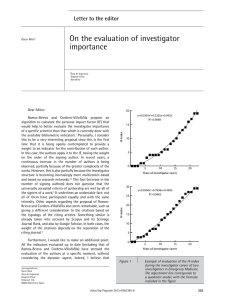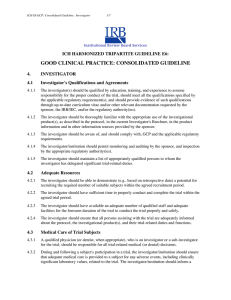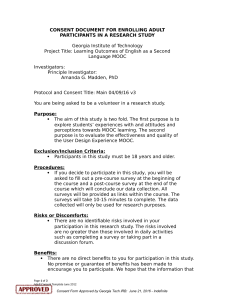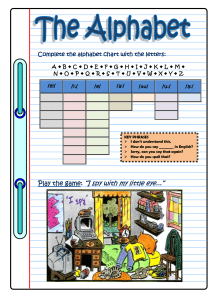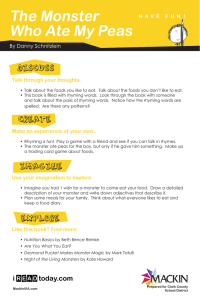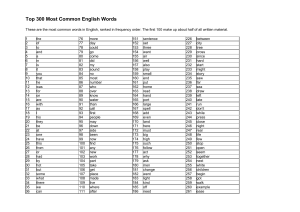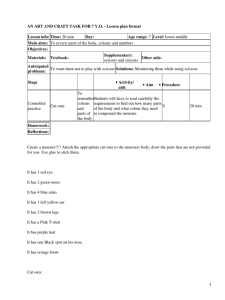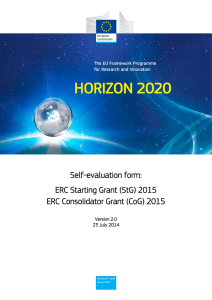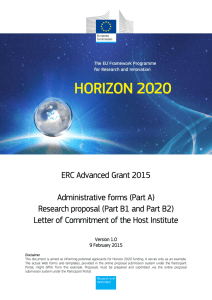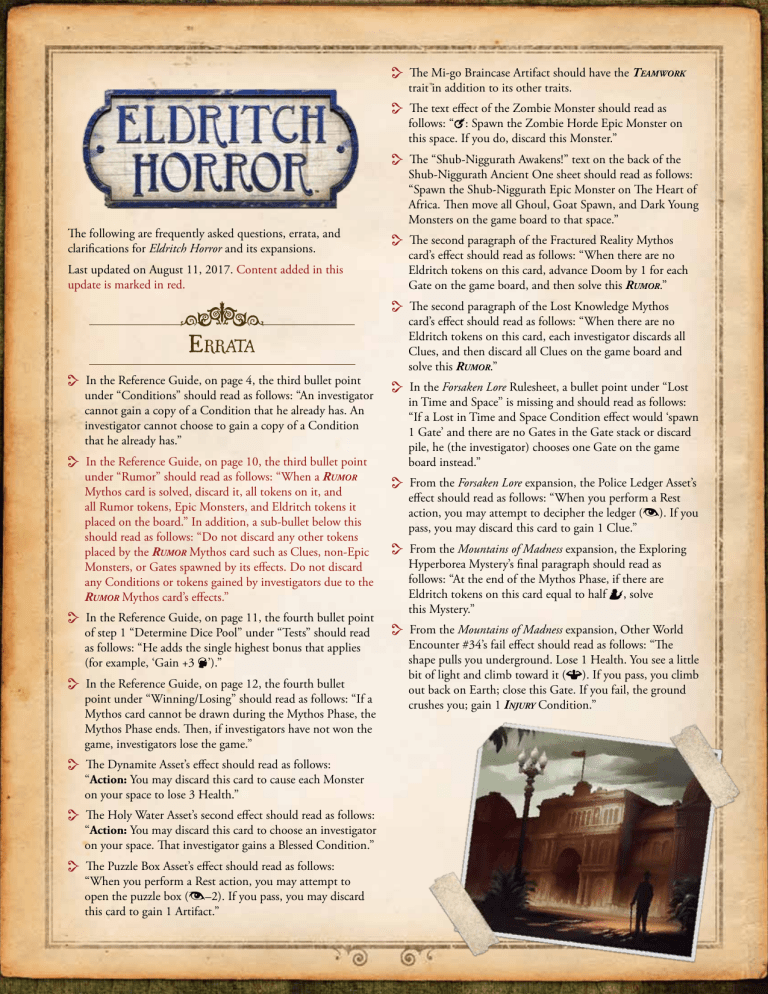
^^ The Mi-go Braincase Artifact should have the Teamwork
trait in addition to its other traits.
^^ The text effect of the Zombie Monster should read as
follows: “@: Spawn the Zombie Horde Epic Monster on
this space. If you do, discard this Monster.”
The following are frequently asked questions, errata, and
clarifications for Eldritch Horror and its expansions.
Last updated on August 11, 2017. Content added in this
update is marked in red.
Errata
^^ In the Reference Guide, on page 4, the third bullet point
under “Conditions” should read as follows: “An investigator
cannot gain a copy of a Condition that he already has. An
investigator cannot choose to gain a copy of a Condition
that he already has.”
^^ In the Reference Guide, on page 10, the third bullet point
under “Rumor” should read as follows: “When a Rumor
Mythos card is solved, discard it, all tokens on it, and
all Rumor tokens, Epic Monsters, and Eldritch tokens it
placed on the board.” In addition, a sub-bullet below this
should read as follows: “Do not discard any other tokens
placed by the Rumor Mythos card such as Clues, non-Epic
Monsters, or Gates spawned by its effects. Do not discard
any Conditions or tokens gained by investigators due to the
Rumor Mythos card’s effects.”
^^ In the Reference Guide, on page 11, the fourth bullet point
of step 1 “Determine Dice Pool” under “Tests” should read
as follows: “He adds the single highest bonus that applies
(for example, ‘Gain +3 {’).”
^^ In the Reference Guide, on page 12, the fourth bullet
point under “Winning/Losing” should read as follows: “If a
Mythos card cannot be drawn during the Mythos Phase, the
Mythos Phase ends. Then, if investigators have not won the
game, investigators lose the game.”
^^ The Dynamite Asset’s effect should read as follows:
“Action: You may discard this card to cause each Monster
on your space to lose 3 Health.”
^^ The Holy Water Asset’s second effect should read as follows:
“Action: You may discard this card to choose an investigator
on your space. That investigator gains a Blessed Condition.”
^^ The Puzzle Box Asset’s effect should read as follows:
“When you perform a Rest action, you may attempt to
open the puzzle box (|–2). If you pass, you may discard
this card to gain 1 Artifact.”
^^ The “Shub-Niggurath Awakens!” text on the back of the
Shub-Niggurath Ancient One sheet should read as follows:
“Spawn the Shub-Niggurath Epic Monster on The Heart of
Africa. Then move all Ghoul, Goat Spawn, and Dark Young
Monsters on the game board to that space.”
^^ The second paragraph of the Fractured Reality Mythos
card’s effect should read as follows: “When there are no
Eldritch tokens on this card, advance Doom by 1 for each
Gate on the game board, and then solve this Rumor.”
^^ The second paragraph of the Lost Knowledge Mythos
card’s effect should read as follows: “When there are no
Eldritch tokens on this card, each investigator discards all
Clues, and then discard all Clues on the game board and
solve this Rumor.”
^^ In the Forsaken Lore Rulesheet, a bullet point under “Lost
in Time and Space” is missing and should read as follows:
“If a Lost in Time and Space Condition effect would ‘spawn
1 Gate’ and there are no Gates in the Gate stack or discard
pile, he (the investigator) chooses one Gate on the game
board instead.”
^^ From the Forsaken Lore expansion, the Police Ledger Asset’s
effect should read as follows: “When you perform a Rest
action, you may attempt to decipher the ledger (|). If you
pass, you may discard this card to gain 1 Clue.”
^^ From the Mountains of Madness expansion, the Exploring
Hyperborea Mystery’s final paragraph should read as
follows: “At the end of the Mythos Phase, if there are
Eldritch tokens on this card equal to half ~, solve
this Mystery.”
^^ From the Mountains of Madness expansion, Other World
Encounter #34’s fail effect should read as follows: “The
shape pulls you underground. Lose 1 Health. You see a little
bit of light and climb toward it (}). If you pass, you climb
out back on Earth; close this Gate. If you fail, the ground
crushes you; gain 1 Injury Condition.”
Errata
cont.
^^ From the Mountains of Madness expansion, the first
paragraph on the back of the “All In” Funding Condition
should read as follows: “With so much money burning a
hole in your pocket, you cannot resist the opportunity to
double your winnings. Roll 1 die.”
^^ From the Mountains of Madness expansion, the Excavating
the Elder Things Adventure’s second paragraph should read
as follows: “When this Adventure is completed, advance the
active Mystery by 1; then draw a random Antarctica III
Adventure.”
^^ From the Mountains of Madness expansion, the Through
the Mountains Adventure’s second paragraph should read
as follows: “When this Adventure is completed, advance the
active Mystery by 1; then draw a random Antarctica III
Adventure.”
^^ From the Mountains of Madness expansion, the Through the
Frozen Waste Adventure’s second paragraph should read as
follows: “When this Adventure is completed, advance the
active Mystery by 1; then draw a random Antarctica III
Adventure.”
^^ From the Mountains of Madness expansion, the Cold White
Silence Mythos card’s effect should read as follows: “When
there are no Eldritch tokens on this card, each investigator
that has a Hypothermia Condition loses 4 Health and
becomes Delayed; then solve this Rumor.”
^^ Starting from the release of the Strange Remnants expansion,
the formatting of a card’s trait line has changed. A card’s
traits are now separated by spaces, not commas.
^^ From the Under the Pyramids expansion, the Haunter of the
Dark Mystery card’s effect should read as follows: “When
this card enters play, spawn the Haunter of the Dark Epic
Monster on Arkham. An investigator on Arkham chooses
an encounter as if the Epic Monster is not on his space
unless he has the Shining Trapezohedron Artifact.”
^^ From the Under the Pyramids expansion, the Doom
replacement effect on the back of the Abhoth Ancient One
sheet should read as follows: “Each time Doom would
advance, spawn 1 Cultist Monster on a Wilderness space
instead; spawn the Monster on a space that does not contain
a Cultist Monster if able. Then, if there are no Cultist
Monsters on this sheet, investigators lose the game.”
^^ From the The Dreamlands expansion, the Focused Training
Prelude’s second paragraph should read as follows: “Talent
Conditions in the reserve can be gained as part of the
Acquire Assets action. Each Talent Condition in the
reserve has value 1. As an additional cost to gain a Talent
Condition, an the investigator must spend 1 Focus.”
^^ From the The Dreamlands expansion, the Twin Blasphemies
of the Black Goat Prelude’s second paragraph should read as
follows: “During step 9 of setup (‘Resolve Starting Effect’),
if Shub-Niggurath is the Ancient One, search the Mystery
deck for the Spawn of the Black Goat Mystery instead of
drawing a random Mystery.”
^^ From the The Dreamlands expansion, the It Could Be
Worse Mythos card’s first paragraph should read as follows:
“When this card enters play, the Lead Investigator loses all
but 1 Sanity.”
^^ From the Cities In Ruin expansion, the Exploring the Crater
Mythos card’s first paragraph should read as follows: “As
an encounter, an investigator on Tunguska may search for
samples of the meteorite that fell there (|). If he passes, he
may spend Clues equal to half ~ to solve this Rumor.”
^^ From the Cities In Ruin expansion, the Return to G’harne
Mythos card’s first paragraph should read as follows: “As
an encounter, an investigator on The Heart of Africa may
search for the symbol that once held the cthonians at bay
(|). If he passes, he may spend Clues equal to ~ to solve
this Rumor.”
QQ. Are effects that say “may,” “or,” and “unless” optional?
Frequently Asked Questions
Below are a number of frequently asked questions organized
by topic. Rulings in this document take precedence over all
other rulings.
Core Mechanics
QQ. Can an investigator resolve a triggered effect multiple times?
AA. No. A triggered effect is resolved exactly once for each time
it is triggered.
For example, the “Bank Loan” effect triggers exactly once when
an investigator performs the Acquire Assets action. As such, an
investigator would not be able to resolve that effect more than
once to add more than two successes to his test result.
QQ. Can an investigator use an ability that lets him roll
“additional” dice after he’s already rolled for a test?
AA. No. When an investigator resolves a test, he must declare
any additional dice he wish to roll before rolling any dice.
QQ. When does the minimum-one-die-on-tests rule apply?
AA. When resolving a test, the investigator, first, calculates his
dice pool. That is, he adds together his skill, Improvements, test
modifier, bonuses, and additional dice. Then he rolls his dice
pool. At this point, if his dice pool is zero or fewer dice, he rolls
one die instead.
QQ. What happens if an effect allows an investigator to reroll up to
two dice but he has rolled only one die?
AA. The investigator may use that effect to reroll his single die.
He cannot use that effect to reroll a single die more than once.
QQ. Is every roll considered a test?
AA. No. An effect that tells you to roll a specific number of dice,
such as the @ effect on a Cursed Condition, is not a test. These
rolls cannot be rerolled or modified by effects that affect tests.
A. Yes. Effects using the words “may,” “or,” and “unless”
grant the investigator a choice. If an effect says, “may,” the
investigator chooses to resolve that effect or not.
If an effect says, “or,” the investigator chooses one of the effects
separated by the “or.”
If an effect says, “unless,” the investigator may resolve the effect
following “unless.” However, if he chooses not to or is unable to
resolve that effect, he must resolve the effect preceding “unless.”
QQ. If an investigator chooses an effect, can that effect be prevented?
AA. Yes. The effect an investigator chooses can be prevented by
another effect. In such a case, the investigator’s choice is not
negated. For example, an investigator must discard his Spell
unless he loses 2 Sanity. If that investigator chooses to lose 2
Sanity, that loss of Sanity can be prevented with the Whiskey
Asset or the Instill Bravery Spell.
QQ. Can an investigator choose not to apply a passive bonus when
resolving a test?
AA. No. A passive bonus, such as “gain +3 {,” must be applied
when resolving a test with the indicated skill.
Some bonuses, such as “you may gain +5 } during a Combat
Encounter,” use the word “may.” As such, these bonuses are
optional and do not need to be applied when resolving a test.
Investigators
QQ. If an investigator uses an effect that applies to “investigators” or
“an investigator,” does that effect include himself?
AA. Yes. Unless the effect says “other investigators” or “another
investigator,” it can affect any or all investigators, including the
one who is using the effect.
QQ. What happens if a new investigator’s starting possessions are
being used by another investigator?
AA. When a player chooses a new investigator, he receives
that investigator’s starting possessions from the decks,
discard piles, or reserve. If the starting possessions are not
in these places, such as if another investigator or a defeated
investigator has them, the new investigator does not start
with those possessions.
QQ. If an investigator has an ability that functions “once per round”
can that ability affect setup?
AA. No. Setup occurs before the first round has begun. As such,
effects with a “once per round” restriction cannot be used
during setup.
QQ. When an investigator is defeated, can the newly chosen
investigator be given the Lead Investigator token at the end of
the Mythos Phase?
AA. Yes. Both choosing a new investigator and passing the Lead
Investigator token occur “at the end of the Mythos Phase.” The
Lead Investigator chooses the order to resolve effects that occur
at the same time, so a new investigator can be chosen, and then
the Lead Investigator token can be passed to him.
QQ. If all investigators are defeated at the same time, do
investigators lose the game?
AA. No. At the end of the Mythos Phase, each defeated
investigator will choose a new investigator to play as. However,
if being defeated would cause a player to be eliminated, such as
if the Ancient One has awoken, all players could be eliminated.
In this case, investigators lose the game.
QQ. How does Finn Edwards’s active ability work?
AA. When Finn Edwards uses his active ability, he chooses
himself, another investigator on his space, or both himself and
another investigator on his space.
If Finn chooses only himself, he moves to an adjacent space
connected by a Ship or Train path.
If Finn chooses only another investigator on his space, that
investigator may move to an adjacent space connected by a
Ship or Train path.
If Finn chooses both himself and another investigator on his
space, Finn moves to an adjacent space connected by a Ship or
Train path, and the chosen investigator may choose to move
to that space as well. Finn and the chosen investigator cannot
move to separate spaces.
QQ. What happens if Finn Edwards uses his passive ability to not
discard a flipped Unique Asset when instructed?
AA. After resolving the effects on the back of a Unique Asset,
if the investigator was not instructed to “flip this card”, the
Unique Asset is shuffled into the Unique Asset deck.
This occurs most frequently when Finn Edwards uses his
passive ability to choose not to discard a Unique Asset, but
it could occur in other ways. Regardless of how it occurs,
the Unique Asset is shuffled into the Unique Asset deck.
QQ. How does Ursula Downs’s passive ability work?
AA. Once per round, Ursula may choose to spend one fewer
Focus when paying for an effect, including spending a Focus to
reroll a die when resolving a test. This can reduce the cost of an
effect to zero Focus.
QQ. Does Wilson Richards’s passive ability allow him to reroll a
single die twice?
AA. No. If Wilson or another investigator on Wilson’s space
spends a Focus to reroll a die and his dice pool is only one die,
that investigator cannot use Wilson’s passive ability.
QQ. How does Charlie Kane’s action ability work?
AA. Charlie Kane’s action ability may allow another investigator
to perform one additional action whether that investigator has
already performed actions during the round or not. However,
he cannot affect a Delayed investigator.
QQ. While the Supplying the North Mystery is in play, can Charlie
Kane purchase a Provisions Unique Asset for another investigator?
AA. No. The effect that allows an investigator to gain a
Provisions Unique Asset triggers when the investigator perform
the Acquire Assets action, but it is not a part of that action. As
such, Charlie Kane is not able to purchase a Provisions Unique
Asset and allow another investigator to gain that possession.
Likewise, Charlie Kane cannot spend two successes during
an Acquire Assets action to move another investigator to
Miskatonic Outpost.
QQ. Can “Skids” O’toole reroll a 1 if that die has already been
rerolled?
AA. Yes. When resolving a test, “Skids” O’toole can reroll any
die with a result of 1. There is no limit to the number of dice
he can reroll or the number of times a die can be rerolled.
QQ. How does Hank Samson’s passive ability work?
AA. When Hank Samson encounters a Monster, if that Monster
has both a { test and a } test, he resolves the } test first.
Then he resolves the { test only if he lost one or more Health
from the } test.
If the Monster has a [ or other test in place of the } test,
Hank resolves that test first, and then he resolves the { test
only if he lost one or more Health.
If the Monster has an | or other test in place of the { test,
Hank’s passive ability has no effect on the encounter.
QQ. If Hank Samson defeats a Monster and loses Health from the
same } test, does he resolve the { test?
AA. No. When a Monster is defeated during a Combat
Encounter, that encounter immediately ends. Hank Samson
will not resolve the { test. (Note: This ruling takes precedence
over any other ruling it contradicts.)
QQ. How does Harvey Walters’s action ability work?
AA. As an action, Harvey Walters chooses another investigator
on his space. That investigator improves one skill of his choice
if Harvey’s value for that skill is equal to or higher than his
own. This comparison is made using the skill’s modified value,
including Improvement tokens and Impairment tokens.
Bonuses to skills, such as from Assets, do not affect a skill’s
modified value.
QQ. Is the additional Clue gained with Mandy Thompson’s passive
ability gained from the Research Encounter?
AA. No. After resolving a Research Encounter, Mandy’s
passive ability could allow her to gain an additional Clue.
However, this Clue is gained from her passive ability, not
the Research Encounter.
QQ. Can Minh Thi Phan use her action ability to gain a travel
ticket even if her space is not connected to another space by the
appropriate path?
AA. Yes. Minh’s action ability allows her to gain a travel ticket of
her choice, even if she could not gain that type of travel ticket
using the Prepare action. Furthermore, Minh can use her action
ability even if she is not on a City space.
QQ. How does Rex Murphy’s passive ability work?
AA. If at any time, Rex Murphy does not have a Cursed
Condition, he immediately gains one Clue and improves one
skill of his choice and then gains a Cursed Condition.
QQ. How does Sister Mary’s passive ability work?
AA. Sister Mary and each other investigator on her space adds
1 to the result of each die rolled as part of an effect printed
on a Condition card that has the Bane or Boon trait. This
modification applies whether the die is rolled as part of a
test or not.
QQ. Can Jenny Barnes use her action ability to allow herself
or another investigator to perform the Acquire Assets action
if that investigator is not on a City space or on a space
containing a Monster?
AA. No. An investigator can perform the Acquire Assets action
only if he is on a City space and only if there are no Monsters
on his space.
QQ. Can Michael McGlen use his action ability if he already has a
Wanted Condition?
AA. Yes. Michael McGlen can use his action ability if he has
a Wanted Condition. If he does, he resolves all effects of the
ability except that he will not gain another Wanted Condition.
QQ. Does Michael McGlen’s passive ability allow him to reroll the
die rolled as part of a Dark Pact’s reckoning effect?
AA. Yes. Michael McGlen’s passive ability allows him to reroll
any single die that is rolled as part of a Deal or Pursuit
Condition’s effect even if the die is not rolled as part of a test.
This includes the one die rolled when resolving the @ effect of
a Dark Pact Condition or a Promise of Power Condition.
QQ. Can Wendy Adams’s passive ability stop her from gaining a
Condition she chooses to gain?
AA. Yes. If an effect allows Wendy Adams to gain a Condition as
part of a cost, such as “you may gain 1 Madness Condition” or
“unless you gain a Blight Condition,” she may use her passive
ability to not gain that Condition instead. If she does, the cost
of gaining the Condition has still been paid.
QQ. Can Amanda Sharpe’s action ability improve the same skill
multiple times?
AA. Yes. If Amanda’s action ability is used to discard multiple
Talent Conditions, she may improve the same skill more than
once. However, she cannot improve a skill to more than two
above its printed value.
QQ. What happens if Kate Winthrop is on a space containing a
Dream Portal and a Gate would spawn on that space?
AA. Both the Dream Portal effect and Kate Winthrop’s
passive ability will attempt to replace the Gate spawn.
The active investigator decides which effect takes priority.
As such, he could have Kate’s passive ability cause the
Gate to be discarded instead of spawning.
QQ. What counts as “encountering a Gate” when using Luke
Robinson’s passive ability?
AA. Luke can resolve his passive ability to ignore Monsters
on his space when choosing an encounter. However, he must
choose to encounter a Gate.
The most common way to encounter a Gate is to draw and
resolve an Other World Encounter card. However, resolving
any encounter that requires Luke to occupy a space containing
a Gate is encountering a Gate. For example, the Caught in the
Web Mystery grants a different option for encountering a Gate.
QQ. What is Luke Robinson’s starting space if there are multiple
Gates on the game board or if there are no Gates on the game
board?
AA. Luke’s Investigator token is not placed during step 3 of
setup as usual. After resolving setup, Luke chooses a space
that contains a Gate and places his Investigator token on that
space. If there are no Gates on the game board, he places his
Investigator token on a space of his choice instead.
Ancient Ones & Mysteries
QQ. Do effects that “advance the active Mystery” or “solve the active
Mystery” affect the Final Mystery?
AA. No. The Final Mystery is not a Mystery card nor is it
considered the active Mystery. As such, effects that advance or
solve the active Mystery do not affect the Final Mystery.
QQ. If the third Mystery would be solved at the end of the Mythos
Phase, but investigators lose the game during the Mythos Phase, is
this the investigators winning and losing at the same time?
AA. No. If investigators lose the game while resolving a Mythos
card, the Mythos Phase has not yet ended, and the third
Mystery is not yet solved.
An example of investigators winning the game and losing
the game at the same time would be if the only remaining
investigator is resolving a Combat Encounter against the
Cthulhu Epic Monster, and his } test result causes both
the Cthulhu Epic Monster and the investigator to be
defeated at the same time.
QQ. Against Azathoth, what does the Eldritch token on the
Omen track do?
AA. When the Omen advances to the green space, Doom
advances by one for each Eldritch token on that space. Note
that Eldritch tokens placed on the green space of the Omen
track do not replace that space of the track. This advancement
of Doom is in addition to the advancement for each Gate on
the game board with the green Omen icon.
QQ. Against Yig, what happens when an investigator is defeated
and Yig has awoken?
AA. Unlike other Ancient Ones, when an investigator is
defeated, that player is not eliminated. The player will selected
a new investigator as if the Ancient One has not awoken.
QQ. When playing against Syzygy, do investigators need to solve two
Mysteries to win the game?
AA. No. When the Syzygy Ancient One sheet is flipped, one
Clue will be placed on the Ancient One sheet for each solved
Mystery. However, the Sealing the Portal Special Encounters
will also place Clues on the Ancient One sheet.
Solving the Mysteries is not required to attempt the Special
Encounters or win the game. However, solving Mysteries
greatly reduces the difficulty of the Final Mystery.
QQ. If an investigator defeats a Cultist Monster as part of a Spawn
of Abhoth Special Encounter during the Encounter Phase, can he
resolve another encounter?
AA. Yes. If an investigator defeats every Monster on his space
during the Encounter Phase, he may resolve an additional
encounter of his choice.
QQ. When resolving a Spawn of Abhoth Special Encounter, can
an investigator benefit from a bonus that applies during a
Combat Encounter?
AA. No. A Spawn of Abhoth Special Encounter is not a Combat
Encounter. As such, bonuses that state “during a Combat
Encounter” do not apply to tests resolved during the Special
Encounter. (Note: This is in contradiction to an entry in the
Frequently Asked Questions section of some printings of the
Under the Pyramids expansion rulebook. This ruling takes
precedence over other rulings.)
QQ. When resolving Nephren-Ka’s reckoning effect, if an investigator
is already on The Bent Pyramid, does he lose Sanity?
AA. Yes. The @ effect on the Nephren-Ka Ancient One sheet
first allows each investigator to move one space toward The
Bent Pyramid. Then each investigator that did not move loses
1 Sanity. Because an investigator on The Bent Pyramid cannot
move closer to the space he occupies, he cannot move and will
lose 1 Sanity.
QQ. Does the Spawn of Hastur Epic Monster’s ability prevent it
from losing two or more Health during a Combat Encounter?
AA. Yes. If any effect, including the effects of a Combat
Encounter, would cause the Spawn of Hastur Epic Monster
to lose two or more Health, it loses one Health instead.
Possessions & Conditions
QQ. Can an investigator choose to discard a possession he does
not want?
AA. No. An investigator cannot simply discard possessions
he does not want. However, he can trade those possession to
another investigator or discard them if an effect causes him to.
QQ. How does the Blunderbuss Asset’s effect work?
AA. Similar to the Double-barreled Shotgun, an investigator
with the Blunderbuss gets two successes for each 6 he rolls
when resolving a } test during a Combat Encounter.
However, for each 1 he rolls during that test he negates one
success. This means that when calculating his total successes,
he subtracts one from the test result for each 1 he rolled to a
minimum of zero successes.
QQ. Can the Grotesque Statue Artifact prevent other investigators
from losing Sanity?
AA. No. The Grotesque Statue Artifact’s second effect allows the
investigator to spend one Clue to prevent himself from losing
Sanity from a single effect. It does not allow him to prevent any
other investigator from losing Sanity.
QQ. Can the Agency Quarantine Asset or the Shrivelling Spell cause
an Epic Monster to lose Health?
AA. Yes. Effects that cause Monsters to lose Health, such as the
Agency Quarantine Asset or the Shriveling Spell, can cause
Epic Monsters to lose Health.
QQ. Can an investigator have multiple copies of the same
Unique Asset?
AA. Yes. There is no limit to the number of Unique Assets an
investigator can have.
QQ. Can an investigator gain a random Unique Asset when told to
gain a random Asset?
AA. No. If an effect says, “gain 1 random Asset from the deck,”
the investigator gains the Asset from the Asset deck, not the
Unique Asset deck. An investigator gains a Unique Asset only
if the effect specifically calls for a Unique Asset.
QQ. What happens if an investigator gains a Courier Run Unique
Asset and there are no Clues in the Clue pool that correspond to
City spaces?
AA. The investigator should discard the Clue on the nearest
City space containing a Clue, placing that Clue faceup on his
Courier Run Unique Asset.
QQ. Does an effect that gives a bonus to [ when resolving Spell
effects apply to the [ test on the front of the Spell card?
AA. Yes. All text on the Spell card, both front and back, is that
Spell’s effect. As such, when resolving the [ test on the front
of the Spell, the investigator adds one bonus to his [.
QQ. If an investigator fails to cast the Wither Spell, can he still use
a different Spell or Asset to gain a bonus to his } test during a
Combat Encounter?
AA. Yes. Choosing to resolve the Wither Spell does not prohibit
the investigator from using other effects to modify his } test.
QQ. Can an investigator cast the Mists of Releh Spell if there are no
Monsters on his space?
AA. Yes. The Mists of Releh Spell does not require an
investigator to be on a space containing a Monster. However,
that investigator will still suffer any consequences of resolving
the Spell’s effects.
QQ. Can an investigator use the Mists of Releh Spell to encounter
some of the Monsters on his space but not all of them?
AA. No. If an investigator passes the [ test of the Mists of
Releh Spell, he chooses an encounter as if there are no Monsters
on his space or encounters all Monsters on his space as normal.
QQ. Can the Clairvoyance Spell allows an investigator to ignore
Monsters on his space?
AA. No. The Clairvoyance Spell’s effect allows an investigator
to choose to encounter a Clue on another space. The
investigator is considered to be on that space for all effects
during that encounter.
QQ. While casting a Blessing of Isis or Plumb the Void Spell, when
is the investigator chosen?
QQ. Can the effects on the front of a double-sided card be used while
the card is facedown?
AA. When resolving the effects of a Blessing of Isis Spell or
a Plumb the Void Spell, you choose an investigator before
resolving the [ test. This choice is made regardless of the
success or failure of the test.
AA. No. Only the currently showing face of a double-sided card
is relevant. While a double-sided card is facedown, the effects of
its front face are ignored and cannot be used.
QQ. Can an investigator benefit from both the Storm of Spirits Spell
and a Weapon Asset?
QQ. Can investigators trade Task Assets?
AA. Yes. Task Assets, like other Assets, may be traded using the
Trade action. If a Task Asset has one or more tokens on it,
those tokens remain on the card when traded.
AA. No. The Storm of Spirits Spell allows an investigator to
resolve a [ test in place of the } test during a Combat
Encounter. If he does, bonuses to his } do not apply to
the [ test. However, bonuses to the investigator’s [ apply
to the test.
QQ. If an investigator gains a Condition during a Rest action,
can he resolve a “when you perform a Rest action” effect of
that Condition?
AA. No. All effects that trigger “when you perform a Rest
action” trigger at the same time as the investigator performs
that action. Any Conditions he gains thereafter will not trigger
until the next time he performs a Rest action.
QQ. Can an investigator with a Lost in Time and Space Condition
be moved by another investigator using the Plumb the Void Spell?
AA. No. If an effect states that an investigator cannot move,
such as a Lost in Time and Space Condition or a Detained
Condition, that investigator cannot move on his own nor can
he be moved by any effect.
QQ. When can an investigator discard a Debt Condition with a
Funding Condition?
AA. If an investigator would gain a Debt Condition and he
already has a Funding Condition, he may discard the Funding
Condition instead of gaining the Debt Condition.
If an investigator has both a Debt Condition and a Funding
Condition, he may discard both cards at any time so long as the
effect of neither Condition is currently being resolved.
For instance, a Mythos card instructs investigators to resolve @
effects; an investigator may choose to discard both Conditions
before resolving the @ effect of either Condition, but he
cannot begin resolving his Debt Condition, decide he doesn’t
like what he sees, and then discard both Conditions before
finishing the effect.
QQ. Does an investigator recover additional Health and Sanity from
effects, such as the Healing Words Spell or Provisions Unique Asset,
if he has a Condition that restricts him from recovering Health or
Sanity during a Rest action?
AA. No. An investigator with a Condition that restricts
him from recovering Health or Sanity, such as Poisoned or
Hypothermia, cannot recover Health or Sanity from a Rest
action including additional Health and Sanity from other
effects during a Rest action.
However, effects that cause an investigator to recover Health
or Sanity without performing a Rest action, such as the Private
Care Asset, affect that investigator as normal.
QQ. When an investigator moves to another space using the Kopesh
of the Abyss Artifact’s effect, does that investigator encounter the
Monsters on his new space?
AA. No. The investigator will encounter each Monster on his
space. Then, if he defeats all Monsters on his space, he may
move to the nearest space containing a Monster. He will not
encounter the Monsters on his new space nor will he resolve an
additional encounter. If he remains on that space until the next
Encounter Phase, he will then encounter each Monster on that
space as normal.
QQ. Can the Crystal of the Elder Things Artifact negate Health loss
that cannot be prevented?
AA. Yes. An investigator with the Crystal of the Elder Things
Artifact cannot lose Health or Sanity from Mythos card text
effects even if that Health or Sanity loss cannot be prevented.
The Crystal does not create a prevention effect that “prevents”
the loss of Health or Sanity if it would occur. Instead, it
prohibits Mythos card text effects from causing the
investigator to lose Health or Sanity.
QQ. If an investigator with a Know Thy Enemy Unique Asset gains
more than one Clue during a Research Encounter, can he place
multiple Eldritch tokens on his task?
AA. Yes. An investigator places one Eldritch token on a Know
Thy Enemy Unique Asset for each Clue he gains as part of a
Research Encounter.
However, Clues gained from other effects, such as Mandy
Thompson’s passive ability, are not gained as part of the
Research Encounter and do not allow the investigator to place
an Eldritch token on the Know Thy Enemy Unique Asset.
QQ. What happens if an investigator gains a Treasure Map Unique
Asset and there are no Clues in the Clue pool?
AA. The investigator should discard the Clue on the nearest
space containing a Clue, placing that Clue faceup on his
Treasure Map Unique Asset.
Actions & Delayed
QQ. Can an investigator’s “additional” action be used to perform an
action he has already performed in that round?
AA. No. An investigator may perform an action only once
each round, even if he is able to perform an additional action,
such as from the Ruby of R’lyeh Artifact or Charlie Kane’s
action ability.
QQ. Can an investigator be Delayed more than once?
AA. No. Becoming Delayed while already Delayed has no effect.
An investigator cannot choose to become Delayed to pay for an
effect if he is already Delayed.
QQ. What happens if an investigator becomes Delayed during
his action?
AA. If an investigator becomes Delayed during the Action Phase,
he immediately ends his current action, loses any remaining
actions, and ends his turn instead. If the investigator has no
actions remaining to lose, he will not become Delayed, and he
will be able to perform actions in the next round.
QQ. If the Lead Investigator or investigators as a group choose an
investigator to become Delayed, can that investigator negate that
effect with the Pocket Watch Asset?
AA. Yes. The Pocket Watch Asset or Mark Harrigan’s passive
ability prevents the investigator from becoming Delayed unless
he chooses to become Delayed to pay for an effect. In this case,
there is a choice involved, but that choice does not pay for an
effect. This remains true regardless of that investigator’s role in
the decision making process and even if the Lead Investigator is
Mark Harrigan or the investigator with the Pocket Watch Asset
and he chooses himself.
QQ. Can an investigator resolve effects with a “during the Action
Phase” restriction if she is Delayed?
AA. No. Effects that state “during the Action Phase” can be
resolved before or after performing an action. An investigator
who begins the Action Phase Delayed, rights her Investigator
token but does not perform any actions. As such, she does not
have an opportunity to resolve effects that state “during the
Action Phase.”
QQ. Does the Trade action cause an investigator to “gain” the
possessions given to her?
AA. No. As part of the Trade action, both investigators may give
any number of their possessions to one another. However, none
of the exchanged possessions were gained as part of the action.
QQ. Can an investigator use a component action multiple times if
he has access to multiple copies of the same component?
AA. Yes. An investigator may use each component action he has
access to up to once per round.
For example, an investigator could perform the component
local action of a Detained Condition of another investigator on
his space as his first action; then perform the same component
local action of a third investigator’s Detained Condition as his
second action.
Similarly, if an investigator has two copies of the Dog Sled
Unique Asset, he could use the component action of both of
those Unique Assets during the same round.
Encounters & Combat
QQ. Can an investigator resolve an “as an encounter” effect if there
is a Monster on his space?
AA. No. Effects that say “as an encounter” are treated just
like any other encounter option available. The investigator
must encounter all Monsters on his space. Then, if there are
no Monsters on his space, he may resolve that effect as his
additional encounter.
If an effect says “instead of resolving an encounter,” such as
the Detained Condition, this can be resolved even on a space
containing a Monster.
QQ. Why do some Research Encounter not give the investigator
the Clue?
AA. Some Research Encounters do not allow the investigator to
“gain this Clue.” However, these encounters often feature other
beneficial effects for the investigator, such as gaining an Artifact
or retreating Doom.
QQ. Can an investigator use multiple weapons during combat?
AA. An investigator can apply only a single bonus to a
test. However, he may use any other effects from his other
possessions. For example, if an investigator has a Bull Whip
Asset and a .45 Automatic Asset, he may apply the +3 bonus
from the .45 to his } instead of the +1 bonus from the whip,
and he may reroll one die by using the whip’s other effect.
QQ. What effects are negated by Physical Resistance and Magical
Resistance?
AA. When resolving a Combat Encounter against a Monster
with Physical Resistance or Magical Resistance, an investigator
cannot apply bonuses to his dice pool as described in the
Mountains of Madness rulesheet.
Bonuses are effects on cards or other components that grant
extra dice when testing a skill. Bonuses are always written with
the following format: “Gain +X Skill” where X is the number of
dice and Skill is the affected skill. For example, the .38 Revolver
Asset says, “Gain +2 } …”
Any other effects that allow rerolls (such as the Lucky Rabbit’s
Foot Asset), dice manipulation (such as the Lucky Cigarette
Case Asset), or “additional dice” (such as Jim Culver’s and
Agnes Baker’s passive abilities) still apply.
QQ. Does Physical Resistance or Magical Resistance restrict an
investigator from using the Storm of Spirits Spell, Shriveling Spell,
or Banishment Spell?
AA. No. The Storm of Spirits Spell allows an investigator to
test [ in place of } during Combat Encounters. This is not
a bonus, and as such, it is unaffected by Magical Resistance
or Physical Resistance. Similarly, the Shriveling Spell and
Banishment Spell do not apply a bonus during a Combat
Encounter, so they are unaffected by Magical Resistance or
Physical Resistance.
Mythos, Gates & Monsters
Preludes
QQ. If a Mythos card’s effect causes another Mythos card to be
resolved, should that Mythos card’s icons be resolved as well?
QQ. If Doom starts on a space containing an Eldritch token placed
by the “Apocalypse Nigh” Prelude, do you resolve a Disaster?
AA. Yes. When resolving a Mythos card, all elements of the
card must be resolved if possible. If a Mythos card’s effect
is to resolve an additional Mythos card, all elements of that
additional card must also be resolved.
AA. No. The Prelude states that a Disaster is resolved only when
Doom advances to a space containing an Eldritch token. Doom
must advance for the effect to trigger.
QQ. Is closing a Gate and discarding it the same thing?
Spaces & Paths
AA. No. Although closing a Gate does cause it to be discarded,
discarding a Gate is not considered closing it. For example,
if an effect would discard a Gate while the Mysterious Lights
Mythos card is in play, that effect is still resolved, discarding the
Gate, even though “Gates cannot be closed.”
QQ. What space type are spaces on the Antarctica side board?
QQ. When is a Monster’s spawn effect resolved?
QQ. Are two spaces connected by a Local path adjacent?
AA. When a Monster is spawned, it’s “When this Monster is
spawned” effect is resolved immediately as part of the effect
that spawned it.
QQ. If a Monster’s or Epic Monster’s toughness is reduced to zero, is
that Monster defeated?
AA. Yes. A Monster or Epic Monster is defeated if it has lost
Health equal to or greater than its toughness. If a Monster’s
toughness is reduced to zero, it is defeated. Even if it has not
lost any Health, zero lost Health is equal to zero toughness.
QQ. What happens if an effect would cause the Omen to advance to
the red space while it is already on that space?
AA. “Advance the Omen to the red space of the Omen track”
means to advance the Omen until it is on the red space. If the
Omen starts on the red space, it will advance four times in total
and return to the red space of the Omen track.
If Syzygy is the Ancient One, this will trigger its “When the
Omen advances to the red space of the Omen track” effect.
QQ. What happens to Gates in the Gate stack after they are
revealed?
AA. Revealed Gates remain where they are in the Gate stack
unless the effect that causes the Gates to be revealed states
otherwise. The Gate stack is not randomized nor are the Gates
discarded or otherwise moved in the Gate stack.
After a Gate in the Gate stack has been revealed, it remains
revealed until it is removed from the Gate stack or the Gate
stack is randomized.
AA. The spaces on the Antarctica side board do not have a
space type. When an investigator encounters a Clue on the
Antarctica side board, he draws and resolves an Antarctica
Research Encounter.
AA. Yes. Two spaces connected by a Local path are adjacent.
QQ. Do paths leading off the side of the game board connect to the
opposite side of the game board?
AA. Yes. Paths that lead off the side of the game board connect
to the corresponding paths on the opposite side of the game
board. For example, Tokyo and space 2 are adjacent, connected
by a Ship path.
QQ. Can there be multiple Clue on a space?
AA. Yes. Some effects move Clues to other spaces or spawn
Clues on specific spaces. There is no limit to the number
of Clues that can be on a space. However, each Clue is
encountered separately.
QQ. Can an investigator interrupt part of his action to move along
a Local path?
AA. Yes. Once per round, during the Action Phase, an
investigator may move along any number of interconnected
Local paths. This movement can be resolved before, after, or
during any action the investigator performs.
QQ. Are devastated cities still “named city spaces”?
AA. Devastated spaces are no longer City spaces; they have no
space type. However, a devastated space does retain its name.
An effect that refers to a “named City space” means a space
that is both a City space and a named space. As such, a
devastated space is not a named City space because it is
no longer a City space.
Variant Reference Cards
With the introduction of new mechanics in Eldritch Horror expansions, some player groups may wish for a more difficult or more
relaxed experience with certain player counts. The variant Reference cards shown below can be used to increase or decrease the
game’s difficulty.
For 1
or
5 Players
Players who desire a less punishing experience for 1 or 5 players
can use the following Reference cards instead of those from the
base game.
Icon Reference
For 4, 7,
or
8 Players
Players who desire a more challenging experience for 4, 7, or 8
players can use the following Reference cards instead of those
from the base game.
Icon Reference
Number of Players
Spawn Gates
Number of Players
Spawn Gates
Spawn Clues
Monster Surge
Spawn Clues
Monster Surge
1
2
1
1
Icon Reference
4
2
2
1
Icon Reference
Number of Players
Spawn Gates
Number of Players
Spawn Gates
Spawn Clues
Monster Surge
Spawn Clues
Monster Surge
5
3
2
1
7
4
3
1
Icon Reference
Number of Players
Spawn Gates
Spawn Clues
Monster Surge
8
4
3
1
